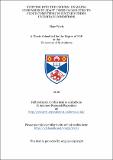Files in this item
Stepping into the clouds : enabling companies to adapt their capabilities to cloud computing to succeed under uncertain conditions
Item metadata
| dc.contributor.advisor | Bowles, Juliana | |
| dc.contributor.advisor | Sommerville, Ian | |
| dc.contributor.advisor | Baxter, Gordon | |
| dc.contributor.author | Werfs, Marc | |
| dc.coverage.spatial | viii, 271 p. | en_US |
| dc.date.accessioned | 2018-07-23T14:04:08Z | |
| dc.date.available | 2018-07-23T14:04:08Z | |
| dc.date.issued | 2016-06-22 | |
| dc.identifier.uri | https://hdl.handle.net/10023/15651 | |
| dc.description.abstract | Recent technologies have changed the way companies acquire and use computing resources. Companies have to adapt their capabilities, which combine business processes, skills, etc., to exploit the opportunities presented by these technologies whilst avoiding adverse effects. The latter part is, however, becoming increasingly difficult due to the uncertain long-term impact recent technologies have. This thesis argues that companies are required to adapt their capabilities in a way that increases the company’s resilience so that they are robust yet flexible enough to succeed under uncertain conditions. By focusing on cloud computing as one recent technology, this thesis first identifies the underlying processes of adapting capabilities to cloud computing by investigating how software vendors migrated their products into the cloud. The results allow the definition of viewpoints that influence the adaptation of capabilities to cloud computing. Furthermore, the Functional Resonance Analysis Method (FRAM) is applied to one software vendor after the migration of their product into the cloud. FRAM enables the analysis of ‘performance variabilities’ that need to be dampened to increase the resilience of systems. The results show that FRAM appropriately informs steps to increase and measure resilience when migrating products into the cloud. The final part develops cFRAM which extends FRAM through the viewpoints to enable the analysis of capabilities within FRAM. The goal of cFRAM is to enable companies to (1) identify existing capabilities, (2) investigate the impact of cloud computing on them, and (3) inform steps to adapt them to cloud computing whilst dampening performance variabilities. The results of the cFRAM evaluation study are unequivocal and show cFRAM is a novel method that achieves its goal of enabling companies to adapt their capabilities to cloud computing in a way that increases the company’s resilience. cFRAM can be easily adapted to other technologies like smartphones by changing the viewpoints. | en_US |
| dc.language.iso | en | en_US |
| dc.publisher | University of St Andrews | |
| dc.rights | Creative Commons Attribution-NonCommercial-NoDerivatives 4.0 International | |
| dc.rights.uri | http://creativecommons.org/licenses/by-nc-nd/4.0/ | |
| dc.subject | Cloud computing | en_US |
| dc.subject | Technological discontinuities | en_US |
| dc.subject | Capabilities | en_US |
| dc.subject | Socio-technical systems | en_US |
| dc.subject | Functional resonance | en_US |
| dc.subject | Resilience | en_US |
| dc.subject | Software vendor | en_US |
| dc.subject | Performance variability | en_US |
| dc.subject | STS | en_US |
| dc.subject.lcc | QA76.585W4 | |
| dc.subject.lcsh | Cloud computing | en |
| dc.subject.lcsh | Business enterprises--Technological innovations--Management | en |
| dc.title | Stepping into the clouds : enabling companies to adapt their capabilities to cloud computing to succeed under uncertain conditions | en_US |
| dc.type | Thesis | en_US |
| dc.type.qualificationlevel | Doctoral | en_US |
| dc.type.qualificationname | PhD Doctor of Philosophy | en_US |
| dc.publisher.institution | The University of St Andrews | en_US |
The following licence files are associated with this item:
This item appears in the following Collection(s)
Except where otherwise noted within the work, this item's licence for re-use is described as Creative Commons Attribution-NonCommercial-NoDerivatives 4.0 International
Items in the St Andrews Research Repository are protected by copyright, with all rights reserved, unless otherwise indicated.


